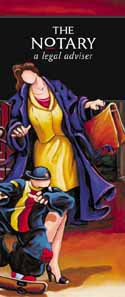 |
< Back
 THE NOTARY A LEGAL ADVISER
THE NOTARY A LEGAL ADVISER
 
The NOTARIAL profession
Of Latin origin, the notarial profession has existed in Quebec since the French Civil Law took root here, giving this province a unique place in the North American legal world. The practice of the profession is managed by the Chambre des notaires du Québec, a professional order governed by the Professional Code. Four years of law at university and the continuous refining of his legal knowledge make today's notary a legal adviser in non-contentious matters and a specialist in preventive law.
AN INTERNATIONAL PROFESSION
The notarial profession exists all over the world except in most countries formerly part of the British Empire. The Chambre des notaires du Québec belongs to the International Union of Latin Notaries. Approximately sixty countries are members of the organization, including France, Japan, Mexico, etc.
In Quebec, there are presently more than 3,500 notaries; they can be found in almost every municipality in the province. Although most notaries are in the private practice of law, they may be found more and more frequently in public and para-public organizations. They are also present in large corporations, trust companies and financial institutions.
THE NOTARY, YOUR LEGAL ADVISER
All your life, you are called upon to make important decisions of a legal nature: marriage, divorce, the financing and purchase of a property, the creation of a business, the preparation of a will, etc.
Faced with a multitude of laws and their ever-increasing complexity, it is impossible for you to evaluate the legal consequences of such decisions. Because of his legal training, the notary can help you make good choices.
As your legal adviser,
- your notary will analyze and synthesize all the information received and evaluate its relevance;
- the notary will propose various solutions to facilitate your decision-making;
- his recommendations will be primarily directed towards reconciliation and agreement between the various parties concerned.
To evaluate proposals, give advice and respect the wishes of those involved, that is the role of a notary.
CONSULTATION: A PREVENTIVE MEASURE
Society often forces us to act quickly. Unfortunately, a hasty decision may result in trouble and costly problems.
Before making any important decision or signing any document, prudence requires you to consult your notary. Such a consultation will enable you to
- know your rights and obligations on the matter under consideration;
- pinpoint those items capable of affecting your personal, tax and financial situations;
- evaluate the advantages and disadvantages of the various solutions proposed;
- choose the form and type of legal action best suited to your needs and wishes;
- prevent unexpected problems
PERTINENT INFORMATION FOR IMPORTANT DECISIONS
As an expert in matrimonial and family lawyour notary will advise you on
- the rights and obligations arising from marriage;
- the choice of a matrimonial regime;
- the use and effects of a marriage contract;
- the family patrimony;
- separation and divorce agreements;
- support and child custody;
- the compensatory allowance;
- the legal consequences of a de facto marriage and agreements between de facto spouses;
- domestic or international adoption;
- the mandate given in anticipation of incapacity;
- tutorship to minors and protective supervision for persons of full age.
As an expert in the law of immovables, your notary will instruct you on the
- importance and consequences of the offer to purchase or offer to sell;
- importance and consequences of the promise to purchase or promise to sell;
- various methods of financing;
- value of your investment;
- taxation implications of your contract;
- necessity for a title examination;
- relevance of a certificate of location;
- preparation and signature of the deed of sale.
As an expert in commercial law, your notary will advise you on
- the procedure that must be followed to set up a company;
- the advantages of a corporation, required formalities and tax consequences;
- the procedure to be followed for adopting by-laws and updating minutes;
- possible agreements between partners or shareholders.
As an expert in the law of successions, your notary will advise you on the
- planning of your succession;
- preparation and drafting of your will;
- protection of your minor children after your death;
- settlement of your succession or that of a loved one.
THE NOTARIAL DEED: A VALUABLE AND REASSURING DOCUMENT
In addition to his role as a legal advisor, the notary is a public officer recognized by the state. He confers on his deeds the character of authenticity. The notarial deed makes proof before any court of justice of its contents, the exactness of its date and the veracity of the signatures. The original of the notarial deed is kept by the notary in his office, safe from loss or destruction and always available to the parties in the form of true and authentic copies.
As a public officer, the notary must remain impartial and inform all the parties to a deed of their respective rights and obligations. They are thus assured of giving informed consent.
The notary is a trained lawyer and ensures that the wishes of parties to a notarial deed do not conflict with the law. He is also a specialist in preventive law and drafts deeds using clear and precise terms to lessen the risk of errors of interpretation.
Your proposals of legal importance are put into concrete form in a notarial deed and are the true reflection of your wishes.
Consult your notary: he leaves nothing to chance.
|








